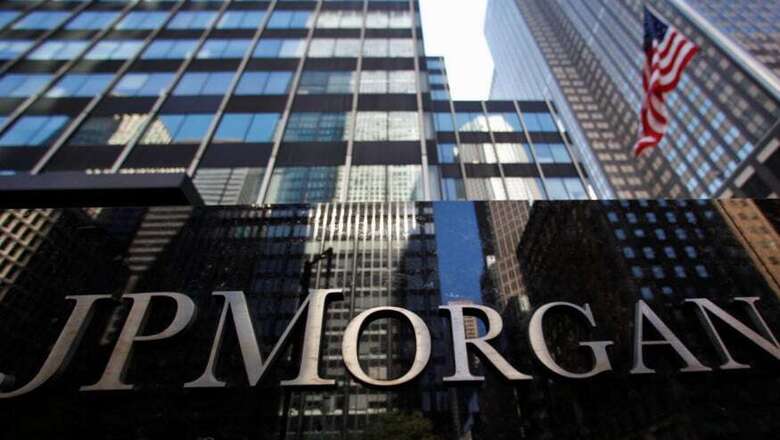
views
Jamie Dimon, Chairman and CEO of JP Morgan Chase, the biggest bank in America by market value, thinks India has a done a phenomenal job lifting more than 200 million out of poverty over the last two decades. The veteran banker was in New Delhi to sign an agreement with the World Bank for scaling up school-to-work transition in India for which JP Morgan has committed $10 million to the World Bank and will begin work in Rajasthan and Maharashtra.
In an interview to CNBC-TV18’s Shereen Bhan, Dimon touched upon a variety of subjects, including India’s slowing GDP growth, unemployment and fiscal challenges. Edited excerpts:
Let me start by talking to you about the agreement that you have done with the World Bank for skilling people here in India — you talk about jobs, jobs, jobs, the conversation has to be about that, the question though is where are these jobs going to come from? Are these going to be manufacturing led, especially for countries like India and do we have the skills to be able to cater to jobs of the future?
So, every country has its issues and it is not unique to India and you have some unbelievable skills here. We have some of your engineers in AI, data scientists who are among the best in the world. But every city can basically look at what jobs it needs, where are the pipelines. Cities have different things — for instance, in Texas it's welding, in other cities it is coding, in others cities it is automotive, so if you do research you can find where the pipelines are and then get the high schools and colleges to start to train people for those jobs, so that when they get out of the school they have a good paying job and it’s important to give an opportunity to people.
So what is the plan with the World Bank, you are putting $10 million into this programme. What do you hope to achieve at the end of it?
The hope is deep knowledge, we do this around the world. This is part of the huge programme that the World Bank has, but in India we have actually done exactly that, we have found out which skills are needed and then we hook them up with people with greater skills, so kids get out with jobs.
You are planning to set up two new centres in India, you have invested about $12 billion in India so far, give me a sense of what kind of future investments we should expect and also headcount additions?
I have been coming here for the better part of 15 years, India has grown almost three times the size, we now cover about 400 companies in India with a lot of multinationals coming in. Our global service centres have gone from 6,000 people to 33,000 people. When we started it was kind of call centres and now it is cyber security, AI, Big Data, Cloud, all these various things. So we have $12 billion of credit here, we also have spent $500 million building great new corporate centres in Mumbai, Chennai and Bengaluru, and it is just part of our plan to continue to grow. So, it has been a great experience for us here and we are going to continue building.
You talked about your experience in India as well as the growth of the Indian economy and while we may have slowed down, we are still among the fastest growing large economies in the world. But you also believe that a lot more needs to be done, while progress has been made on the reform front, more needs to be put on the table — specifically what is it that you would like to see?
So, you have been the fastest growing nation for decades or at least for the last several years but I think you should be the fastest growing for the next 10-20 years. I think your prime minister has actually done a terrific job; the politics is hard you have to get things through Congress, etc, so I think the GST reform is excellent, corporate tax one is excellent, bankruptcy reform is desperately needed but obviously infrastructure and you have a huge infrastructure programme now, your biometrics system is good, these things will help drive growth for a long time and there is a whole long list related to banks, mergers of the bank and state-owned enterprise. Those are necessary and I wish him really well.
You spoke about one of the things that has been done recently by the government and that is to bring down corporate taxes — there are two arguments that that is not necessarily the best thing to get India out of a demand slowdown and what has the experience been like in the US because President Trump did this big corporate tax cut and the impact of that on the economy?
I look at this differently, if you want to maximise the growth of your economy, you should have a very competitive corporate tax rate. If you don’t have competitive tax rate at the margin, your capital will go elsewhere. I look that as a sine qua non. So in the US, a trillion dollars were retained or came back, capex did go up, it is coming down now mostly because of the trade-related things but I look at it as sine qua non. It is a bad idea to have tax rate higher than everybody else. It is not that it will change every decision, but at the margin, will it help capital come to this country or be retained here, absolutely.
Speaking of capital coming into the country, in the context of the current trade dispute between the US and China, do you believe that India is likely to be a big beneficiary?
I think they should.
You are sounding tentative?
No. I think the government has to gear up and say how we are going to make ourselves more attractive to the supply lines when they have to choose between Brazil, Mexico, China and India; how do you make yourself more attracted to India and I know they are doing it. So, I do think that gives India a much bigger opportunity than it would have otherwise.
Just linked to that, I am asking you this question and you have probably heard from your team here in India — the fact is we have seen credit growth slowing down, in fact coming in at its lowest level in about two years and banks are grappling with what needs to be done, at this point in time the Reserve Bank of India has cut rates by 135 basis points, there are questions on why we haven’t seen the transmission adequate to what the cuts have been on the repo, but as a banker how do you look at this problem?
I think people make a mistake thinking that if you push upon interest rates that changes everything. Very often interest rates are the reflection of what is going on in the economy. Companies that borrow money, borrow money when they need to borrow. So growth actually drives borrowing, their demand book drives borrowing and if things slow down that will actually go down. But having said that, reducing rates can help too. It is one of the two rules that can help economy grow a little faster.
Speaking of reducing rates, and of course there has been a lot of pressure on the Fed as well as this dialogue on where interest rates should be and we have seen what has happened in Europe with interest rates. What is your take on where interest rates could be headed in the US?
I cannot imagine ever in the history of the world that a president or a prime minister woke up in the morning saying I wish I had higher rates. So, it is not unknown that you want lower rates and things like that. I think negative rates – I think when they did it earlier on, there was a notion that we are saving the European Union – the monetary union, which is one thing. I think as a permanent part of policy it is a really bad idea. It has adverse consequences which we do not fully understand. Regulatory policy has locked up a huge amount of capital in liquid sovereign debt that is sitting there for the rest of our lives. So, if you want to have growth you better really think through with the policies not just around negative rates but capital allocation, etc. So, I hope it doesn’t happen in the US. I think we would be studying for 50 years what the effect was.
Do you see another cut by the Fed though?
May be, but I really do not worry about that. These things are so minor in the great scheme of stuff, they are more psychological than anything else.
You said you do not worry about what the Fed will do or won’t do and you do not worry about quarterly earnings either. Then let me ask you about business confidence and consumer confidence and if we are seeing a growing disconnect between the two because consumer confidence at least in the US continues to look strong but what about business confidence?
Consumer confidence is quite strong, it is like in the upper quartile. Housing is in short supply, wages are going up, the balance sheet of the consumer is very good, so that American consumer which is 70 percent of GDP, is still doing fine. However, you are absolutely correct that 30 percent of business confidence has gone from all-time high to kind of middle of the pack, capital expenditure has come down and it is all around kind of geopolitical and trade-related concerns.
That is the number one risk you believe?
Yes, and I think it has caused a slowdown. A lot of CEOs, not all of them – some would say it doesn’t affect me at all but a lot would say, “I am slowing down that decision to do this in Mexico, do this in Brazil, this in China, this in India, I want to see how this plays out. I am concerned about A, B and C”. So, confidence – you are absolutely correct there is a kind of a secret sauce, we do not fully know the effect on businesses and consumers but we know that it has a real effect. When you are comfortable in your job, when you are comfortable that your salary is going up, you might build that extension in your house, you might buy that new car and so those things do matter.
Do you fear that we could possibly be staring at a recession?
It is possible. I have never seen people predict a recession accurately. I worry about it because it hurts people, so I do not want a recession and we are always prepared for one. What I want to do is run my company, serve my clients including countries in good times and bad, managing through the risk of a recession.
My own view, and I am just looking at the possibilities and probabilities, is that it is a slowdown not on the way to zero. The reason for that is, India is still growing at near 5 percent, China is at 5 percent, America looks like it is still 2 percent, Japan and Europe look like they might be one percent plus or something like that, so that is a slowdown.
In this context of accommodative or loose monetary policy world over and central bankers sort of coordinating their action as well and the regulatory framework that we have in place in countries like the US and everywhere else, do you believe that the financial markets while volatile are perhaps less vulnerable to a Lehman-like problem?
Yes. Lehman wouldn’t happen today because of Dodd-Frank Act. The regulators should take a victory lap in this. Lehman would have had two or three times more equity capital, two or three times more available in debt, the regulators had the legal authority to take them over and the money would have continued going around in the system and they can manage it. I do think there are other parts of regulations that are causing concerns in the lending market and the repo markets and things like that. We strongly believe in the independence of the central bank but there is nothing wrong with the government very thoughtfully thinking through fiscal policy, monetary policy, regulatory policy, so that they get this right to maximise growth because if you do not get it right, you will not have maximum growth.
If you believe that monetary policy is not necessarily the only silver bullet, what is it that you believe could be done on the fiscal side? We have already seen the government provide the corporate tax cut. The assumption is that there will be a personal income tax cut coming soon. However, what could be done perhaps on the fiscal side especially here in the Indian context?
I am not an expert in your fiscal situation but usually it means getting more money in the hands of people who spend it and being attractive. However, as I said it is also not just fiscal, it is also regulatory. It is laws, rule requirements to free up the animal spirits and free up capital to invest their money and get more people to work. So, it is not just about spending more money. There are lot of people who spend more money and it doesn’t go very well.
One final question on technology. You spend about $11.5 billion on technology every year and you have been betting on technology for the last many decades now. How do you see technology now changing, not just banking but also your competitive landscape?
The difference is, it is faster, you have got more money going to fintech. I believe in competition, so I think people should be able to fully compete. I do a good job of my own but right now at JPMorgan Chase you can buy FX and move around the world. So, we have to give our clients great things and which is good competition. So, it is faster, AI is real, Cloud is real, privacy is real and we just have to do the best job serving our clients and we study all the fintech competitors. I want to make sure we understand what they are doing, so that we can build our products and service to compete with them too.




















Comments
0 comment